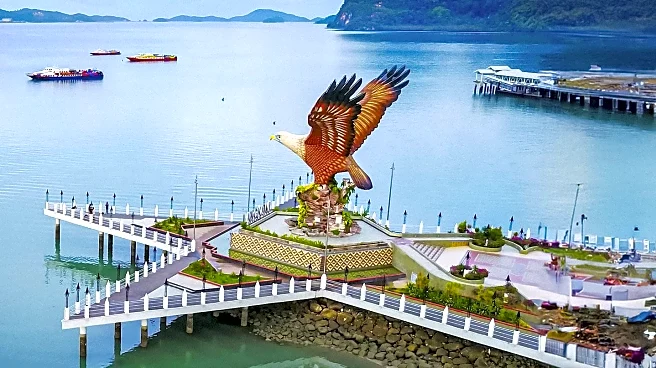What's Happening?
Langkawi, an archipelago of islands, is celebrated for its beautiful beaches and aquatic life. The largest island, Pulau Langkawi, offers stunning natural settings perfect for relaxation and adventure. Visitors can rent vehicles to explore the island's
beaches, such as Pantai Cenang and Pantai Kok, which offer different atmospheres from lively to secluded. Langkawi is also known for its duty-free shopping, providing a variety of goods at competitive prices. The island's diverse culinary scene includes traditional Malay, Indian, Thai, and Chinese cuisine, with an emphasis on fresh seafood.
Why It's Important?
Langkawi's tourism industry plays a crucial role in Malaysia's economic landscape, attracting international visitors and boosting local businesses. The island's duty-free status enhances its appeal, drawing tourists for shopping and leisure activities. Langkawi's natural beauty and cultural diversity offer unique experiences that contribute to its reputation as a top travel destination. The tourism sector supports employment and economic growth, while efforts to preserve the island's environment ensure sustainable development.
What's Next?
Langkawi is expected to continue expanding its tourism offerings, with potential developments in eco-friendly initiatives and cultural experiences. The island's focus on sustainable tourism practices aims to balance economic growth with environmental conservation. As global travel trends shift, Langkawi may introduce new attractions and services to cater to diverse visitor interests, enhancing its appeal as a premier destination.
Beyond the Headlines
Langkawi's designation as a UNESCO Global Geopark underscores its geological importance and commitment to conservation. The island's cultural heritage, including traditional Malay architecture and customs, provides visitors with insights into Malaysia's rich history. Langkawi's integration of modern amenities with natural attractions offers a balanced experience, promoting relaxation and adventure. The island's approach to sustainable tourism serves as a model for other regions seeking to balance development with environmental preservation.
















